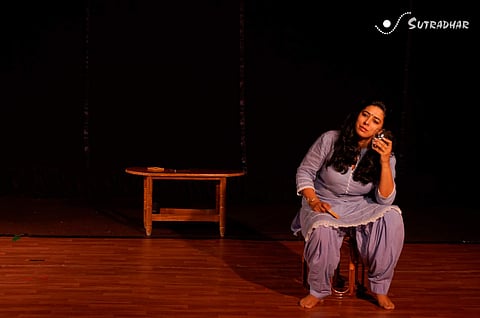
- LIFESTYLE
- FASHION
- FOOD
- ENTERTAINMENT
- EVENTS
- CULTURE
- VIDEOS
- WEB STORIES
- GALLERIES
- GADGETS
- CAR & BIKE
- SOCIETY
- TRAVEL
- NORTH EAST
- INDULGE CONNECT

Ahead of International Women’s Day, Vinay Varma, veteran actor-turned-director and founder of 1996-born city-based casting house and theatre ensemble, Sutradhar upholds feminist movements and through the powerful medium of art, strives to eradicate gender bias. He has around four decades of experience in the performing art form and together with his hub of thespians, presents Adhikaar – two solo acts played by and about women — wherein the characters jostle for their space in a patriarchal setup. The first act Dushala has references to Tamil versions of the Mahabharata and acknowledges the presence of women in our epics. Referring to both enactments, he tells us, “The challenge in a solo performance is to show characters not seen on stage but how they are written in the script.”
In the two solo acts, how did you employ your directorial lens, as a man and an artiste to acknowledge the patriarchal tumults which women have been facing throughout history?
An artiste should be bereft of gender bias; it’s more about sensibility and being sensitised to situations. While undoubtedly women over the ages have been victims of patriarchal power, I’ve kept myself away from being an activist and focused more on the text, and the sub-text within. I don’t claim to be fighting for rights of any kind. My job as a director is, to be honest with the script and not the gender within.
The second act, Weekend draws from Nirmal Verma’s famous trilogy Teen Ekaant. Why do you think the book is important to discuss taboo topics such as divorce and solitude?
The setting of this play is Europe, written in the 70s and finds its resonance in India today and perhaps elsewhere too. Reading a book is different from performing it. Therefore, when issues like divorce, extra-marital relationships, single parenthood, and the choice of a sex partner are performed before a live audience, many are jolted. And that precisely is the purpose of theatre — to disrupt, to stimulate and not just entertain.
In both acts, how do you take creative leaps as an artiste while maintaining the original essence of the texts?
That’s the catch, and that is where the director steps in. It is through the appropriate use of space and properties, and dialogue delivery that one can make a difference without affecting the actual text. The important thing is that a text must have an instant connection no matter what the context is. For example, in Weekend, Nirmal mentions trams, but I’ve taken the liberty of using buses which had no impact on the text. Also, I began the play with the last part where she ends a long phrase with “…main sirf laut rahee hoon” and then with a blackout, the play begins and ends with where it began, thereby emphasising the decisiveness of this lonely woman in love with a married but separated man. As for Dushala, which we titled Dhuli Kanya Dushala in Bengali, I used just a dupatta as a prop, whereas the writer Pritham (K Chakravarthy) insisted that we show her chained and use an earthen pot and break it — a point to symbolise death and destruction. I wanted to show the claustrophobia without the chains, through expressions and movements, and since our Dushala, Mila Deb is a trained classical dancer, we incorporated steps, bhaav and mudras from Odissi, Bharatanatyam and folk. On the contrary, Weekend, enacted by Ratika Sant Keswani, is a subtle piece on intimacy, bearing a feminist motif.
March 4 at Lamakaan, Banjara Hills.
E-mail: chokita@newindianexpress.com
Twitter: @PaulChokita